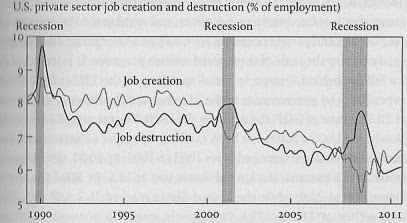Bryan Caplan found a disturbing graph from Edmund Phelps's new book "Mass Flourishing: How Grassroots Innovation Created Jobs, Challenge and Change":
Caplan infers:
Btw, notice one more interesting fact - an economy always experiences job losses, even in very good economic times (90s, 2000s), however, as long as the rate of job creation is higher than the rate of job destruction the economy is doing well. The whole point of creative destruction is that companies should be allowed to go under, since when they do their owners develop new ideas until they find a successful one - it's a classical trial and error process (as it always is in life). The rate of companies going bankrupt and new companies emerging is quite similar to the above picture of job growth. It is only from a persistent trial and error process that new ideas and efficient patterns of production emerge. One should never attempt to interfere with this process in any way.
 |
| Source: Brian Caplan, taken from Phelps: Mass Flourishing |
"At first glance, this confirms a quarter-century of steadily declining creative destruction - falling job creation and job destruction. On closer look, though, there was little trend until the small recession of the early 2000s. Since then, however, creative destruction has relentlessly fallen.Striking fact: The rate of job destruction during the Great Recession used to be perfectly normal! We experienced it as a calamity because job creation not only kept falling, but dipped below expectations."
He's right, the trend is obvious only in the pre-crisis decade. One could easily link this pre-crisis decline in job creation to the outsourcing trend or even to the role of technological progress. I've covered this topic extensively; it implies that the necessary restructuring in the labour markets was prevented as many companies didn't see fit to lay off workers as an reaction/response to the ongoing technological shock, however, once the crisis had started the layoffs were inevitable. Their inaction prevented the process of restructuring and re-specialization into new skills.
This implies that the rate of job destruction prior to the 2007-09 crisis should have been higher, so that the rate of job creation would have been higher as well, since they basically follow a very similar pattern. A plausible, even testable assumption. I might look into it.
Btw, notice one more interesting fact - an economy always experiences job losses, even in very good economic times (90s, 2000s), however, as long as the rate of job creation is higher than the rate of job destruction the economy is doing well. The whole point of creative destruction is that companies should be allowed to go under, since when they do their owners develop new ideas until they find a successful one - it's a classical trial and error process (as it always is in life). The rate of companies going bankrupt and new companies emerging is quite similar to the above picture of job growth. It is only from a persistent trial and error process that new ideas and efficient patterns of production emerge. One should never attempt to interfere with this process in any way.